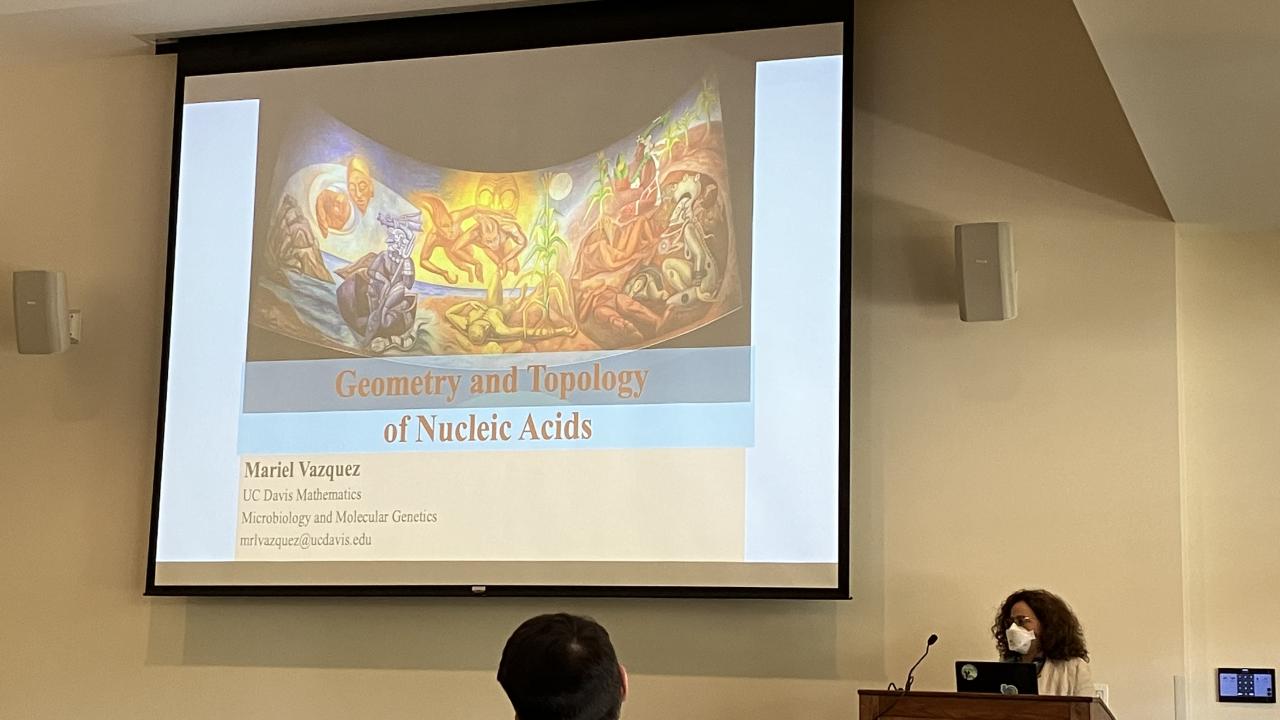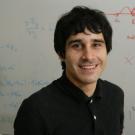
Event Date
⭐️ Presented by the Office of Academic Diversity, part of the Division of Diversity, Equity and Inclusion
ADVANCE Award Symposium
"Exploring Biological Phenomena through Mathematics"
The Division of Diversity, Equity and Inclusion (DEI) and the Center for the Advancement of Multicultural Perspectives on Science (CAMPOS) are proud to announce Professor Mariel Vázquez, Ph.D. as the 2024 ADVANCE Scholar Award recipient.
This prestigious UC Davis award is given to mid-career and senior faculty at UC Davis who advance diverse perspectives and gender equity in STEMM through their teaching, research and service. The recipients receive a small cash award and deliver a distinguished campus lecture at the ADVANCE Award Symposium. Visit the award announcement for more information.
Let us know if you can make it!
Awardee
Mariel Vázquez

Professor, Mathematics; Microbiology and Molecular Genetics
Geometry and topology of nucleic acids
The genetic code of viruses and of living organisms is contained in very long DNA or RNA molecules, which are tightly packaged in confined environments. The molecules need to coil upon themselves in order to fit. I study the changes in DNA topology mediated by essential processes such as DNA packing and transcription of DNA into RNA. These processes are highly regulated, and even small structural changes can lead to catastrophic effects. We use techniques from knot theory and topology, aided by discrete and computational methods, to model the geometry and topology of nucleic acids. In this lecture, I will present our current research. The presentation is accessible to students and suitable for a diverse interdisciplinary audience.
Invited Speakers
Fernanda S. Valdovinos

Associate Professor, Environmental Science and Policy
Evaluating responses of ecological networks to environmental change
Life on Earth is facing multiple challenges posed by climate change, overexploitation, habitat loss, and species invasions. Interdisciplinary research is at the forefront of understanding and managing these challenges, offering hope for mitigating their impacts on ecosystems. This talk will present three projects that illustrate how interdisciplinary approaches can enhance our understanding of how ecosystems respond to rapid environmental change. The first project explores the stabilizing mechanisms of plant-pollinator networks, demonstrating how the adaptive foraging behavior of pollinators interacts with network structure to enhance stability. The second project investigates plant invasions within plant-pollinator networks, revealing the nuanced impacts of non-native plant species on network structure and native plant communities. This work emphasizes the importance of considering transient dynamics in determining the success of invasions. The third project focuses on fisheries management, uncovering the complexities of bycatch policies and their ecological and economic consequences, while advocating for an ecosystem-based approach to sustainable fisheries. Together, these projects underscore the significance of interdisciplinary research, which integrates mathematical models, computational simulations, and empirical data to address environmental challenges. By leveraging these tools, we can pave the way for more informed and effective conservation strategies.
Joseph M. Teran

Professor, Mathematics
Computational Mechanics and Machine Learning
I will discuss three recent results from my lab related to the application of machine learning techniques to the simulation of computational solid and fluid mechanics. First, I will discuss a data-driven preconditioner for discrete Poisson equations that arise in the simulation of the incompressible Euler equations. These Poisson systems are defined over regular grids with irregular voxelized internal boundaries (e.g. at water free surface and at solid boundaries). This irregularity complicates the use of fast solvers like multigrid etc. We show that a data-driven model can be used to learn an approximate inverse capable of accelerating Krylov methods beyond the performance possible with a state-of-the-art algebraic multigrid preconditioner. Second, I will discuss the use of machine learning techniques in estimating elastic equilibria. This type of technique is used to improve the realism of animated characters in visual effects applications. Lastly, I will discuss the application of this in the computational biomechanics of musculoskeletal driven locomotion.
Program Schedule
| 12:00pm | Doors open |
| 12:25pm | Welcome remarks, CAMPOS Faculty Director Verónica Martínez-Cerdeño |
| 12:30pm | Fernanda S. Valdovinos, Environmental Science and Policy, "Evaluating responses of ecological networks to environmental change" |
| 1:15pm | Joseph M. Teran, Mathematics, "Computational Mechanics and Machine Learning" |
| 2:00pm | Poster session |
| 3:20pm | Keynote Mariel Vázquez, Mathematics; Microbiology and Molecular Genetics: "Geometry and topology of nucleic acids" |
Last updated February 19, 2025
Let us know if you can make it!
Are you interested in presenting a poster at the symposium? Undergraduates, graduates, and postdocs involved in biology, mathematics, teaching, mentoring, or bias in science are invited to submit an abstract for a poster presentation. If you would like to present at the poster session, please fill out this form.
If you have questions, please email Thomas O'Donnell (twodonnell@ucdavis.edu).
